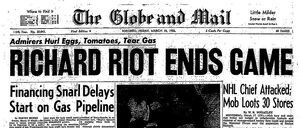
Richard Riot Ends Game, March 3, 1955.
The Richard Riot was a riot that occurred on March 17, 1955 in Montreal, Quebec. Maurice Richard, the star ice hockey player for the Montreal Canadiens, was suspended for a violent attack on a linesman and it provoked a riot at the Montreal Forum that spilled out into the streets. Some commentators have linked the Richard Riot with the birth of Quebec nationalism and the Quiet Revolution.[1]
Incident[]
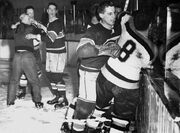
Hal Laycoe on the far left with Bert Olmstead while Jean Béliveau restrains #8 Fleming Mackell. Richard is behind Beliveau with linseman Cliff Thompson.
As Montreal's great star, it was common for Richard to be antagonized on the ice. Teams would reportedly send one or two players to do nothing more than annoy him, yelling 'frog' insults and hooking, slashing and holding him as much as possible. Throughout his career Richard was fined and suspended several times for retaliation assaults on players (and even officials). One such incident would spark one of the worst hockey-related incidents in history.
On March 13, 1955, Richard was part of an ugly scene in a game against the Boston Bruins. The Bruins' Hal Laycoe, who had played defence for the Canadiens previously, high-sticked Richard in the head during a Montreal power play, cutting Richard for five stitches.[2] Referee Frank Udvari signalled for a major penalty to be called on Laycoe, but play was allowed to continue because the Canadiens had possession of the puck. Richard indicated to the referee that he'd been injured, and then skated up to Laycoe—who had dropped his stick and gloves preparatory to a fight—and struck Laycoe in the face and shoulders with his stick. The linesmen attempted to restrain Richard, who repeatedly broke away from them to attack Laycoe, even breaking his stick over his back. Moments passed and linesman Cliff Thompson restrained Richard by holding both his arms in a lock, giving Laycoe a "free shot" to punch Richard. Richard then broke loose and punched Thompson twice in the face, knocking him unconscious.[3] Richard then left the ice with the Canadiens's trainer. According to Montreal Herald writer Vince Lunny, Richard's face looked like a "smashed tomato."[4]
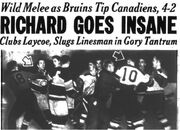
Another view of the melee with Richard and Laycoe marked with arrows.
Richard was given a match penalty and an automatic $100 fine. It was Richard's second incident with an official in that season. He had slapped a linesman in the face in Toronto the previous December and was fined $250.[3] The match penalty meant a league hearing would take place and it was scheduled for March 16. Richard was not suspended but did not practice, sent to the hospital by team doctors on March 15 after complaining of headaches and stomach pains.[5]
After the game, Boston police attempted to arrest Richard in the dressing room. A group of police officers were turned back by the rest of the Canadiens' players who barred the door, preventing any arrest. Bruins management finally persuaded the officers to leave with a promise that the NHL would handle the issue. Richard was never arrested for the incident.[6]
Hearing[]
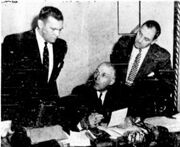
A league disciplinary hearing took place on March 16, attended by the on-ice officials, Richard, Laycoe, Montreal assistant GM Ken Reardon, Boston GM Lynn Patrick, Montreal coach Dick Irvin and NHL referee-in-chief Carl Voss. In his defense, Richard contended that he was dazed and that he thought Thompson was one of Boston's players. He did not deny making any of the punches or attacking Laycoe.[7]
After the hearing NHL president Clarence Campbell made the following statement:
I have no hesitation in coming to the conclusion that the attack on Laycoe was not only deliberate but persisted in the face of all authority and that the referee acted with proper judgment in accordance with the rules in awarding a match penalty. I am also satisfied that Richard did not strike linesman Thompson as a result of a mistake or accident as suggested. There is singularly little conflict in the evidence as to important relevant facts. Assistance can also be obtained from an incident that occurred less than three months ago in which the pattern of conduct of Richard was almost identical, including his constant resort to the recovery of his stick to pursue his opponent, as well as flouting the authority of and striking officials. On the previous occasion he was fortunate that teammates and officials were more effective in preventing him from doing injury to anyone and the penalty was more lenient in consequence. At the time he was warned there must be no further incident. It was too bad that his teammates did not assist officials instead of interfering with them. The time for probationary lenience has passed, whether this type of conduct is the product of temperamental instability or willful defiance of the authority of the game does not matter. Richard will be suspended from all games both league and playoff for the balance of the current season.[8]
The suspension – at the time, the longest for an on-ice incident in league history – was considered by many in Montreal to be unjust and severe. No sooner had the judgment been handed out that the NHL office (at that time, the NHL head office was in Montreal) was deluged with calls from enraged fans.[9]
Reaction from around the league revealed a general feeling that the punishment could have been more severe. Detroit Red Wings general manager Jack Adams commented that Campbell "could do no less" and "I thought he would be suspended until January 1 of next season." Red Wings forward Ted Lindsay, who had himself recently been disciplined by the league with a four-game suspension (for an incident in Toronto when he attacked a Maple Leafs fan who was threatening his teammate Gordie Howe), opined that Richard was lucky not to get a life suspension, stating "in baseball, football or almost anything else that much would be almost automatic. I say they should have suspended him for life." Bruins president Walter A. Brown agreed with Adams, saying "That's the least they could do", and Bruins player Fleming Mackell commented that "if they had thrown the book at Richard in 1947 when he cut Bill Ezinicki and Vic Lynn, it might have stopped him and made him an even greater hockey player because of it."[10]
Riot[]
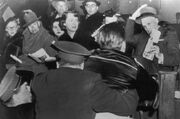
Campbell, sitting with 3 female secretaries from his office, is attacked by a fan, March 17, 1955.
Public outrage from Montreal soon poured in. Local radio call-in shows became so inundated with calls that radio stations were begging people not to call in. For his part, Campbell did not budge, and announced that he would be attending the Canadiens' next home game against the Red Wings on March 17. Security was increased at the game, which itself was uneventful. However, it saw many protesters with signs that read "A bas Campbell" or "Vive Richard", even "Pas de Richard, pas de Coupe (Stanley Cup)", with much of the crowd noise directed at Campbell, and few paying attention to the game or to the fact that Richard himself had also taken a seat at the game. As Montreal coach Dick Irvin pointed out, "the people didn't care if we got licked 100-1 that night."
Midway through the first period, Campbell arrived with three secretaries from his office. The 15,000 in attendance immediately started booing Campbell. Some began pelting them with eggs, vegetables, and various debris, with more being thrown at him each time the Red Wings scored. At period’s end, with the Red Wings leading 4-1, a fan walked up the steps toward Campbell. Jimmy Orlando, a Montrealer who was as tough an NHLer as there was during his four seasons and small parts of another two with the Red Wings, had left his seat on the promenade level to follow the fan, who approached Campbell with his hand outstretched.
When Campbell reached for it, the fan brought his hand up sharply and slapped the president across the face, whereupon Orlando, who was only one step below the fan, reached up, spun him around and, in one motion, struck him with all the power he could muster in his 185 pounds. Now, all hell broke loose. Seconds after Orlando left the fan's face in a bloody mess, a tear gas bomb exploded. In what seemed like no time at all, a yellow mass of smoke sent fans screaming toward the main lobby. People were choking, coughing and retching. Many yelled "fire!" In a matter of only a few minutes, the building was ordered cleared, and the game forfeited to the Red Wings.
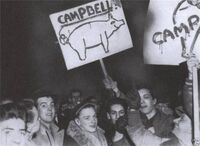
Rioting in the streets of Montreal.
The tear gas bomb and forfeiture had also altered the mood of the incident, turning it destructive and violent. A riot ensued outside the Forum, causing an estimated $100,000 in damage to the neighborhood and the Forum itself. Hundreds of stores were looted and vandalized within a 15-block radius of the Forum. Twelve policemen and 25 civilians were injured. The riot continued well into the night.[11] Local radio stations, which carried live coverage of the riot for over seven hours, had to be forced off the air. The riot eventually ended at 3 am, and left Montreal's Saint Catherine Street in shambles. The police arrested 41 persons, 4 of them juveniles.[12]
Adams was quoted as blaming Montreal officials after the game: "If they hadn't pampered Maurice Richard, built him up as a hero until he felt he was bigger than hockey itself, this wouldn't have happened."[13]
The incident was national news in Canada. Reporters lined up to see both Campbell and Richard on March 18. Richard was reluctant to make a statement, fearing that it could start another riot, but eventually gave the following statement:
Because I always try so hard to win and had my troubles in Boston, I was suspended. At playoff time it hurts not be in the game with the boys. However, I want to do what is good for the people of Montreal and the team. So that no further harm will be done, I would like to ask everyone to get behind the team and to help the boys win from the New York Rangers and Detroit. I will take my punishment and come back next year to help the club and the younger players to win the Cup.[14]
Campbell was unapologetic. He said that he considered it his "duty" as president to attend the game. Montreal mayor Jean Drapeau was livid at Campbell for attending, and laid the blame for the riot on Campbell. A Montreal city councillor wanted Campbell arrested for inciting the riot.[15]
Aftermath[]
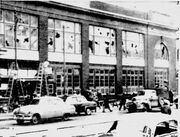
Repair crews fix broken windows in the Forum.
The suspension came when Richard was leading the NHL in scoring and the Canadiens were battling Detroit for first place. Richard's suspension also cost him the scoring title, the closest he ever came to winning it. When Richard's teammate Bernie Geoffrion surpassed Richard in scoring on the last day of the regular season, the Canadiens' faithful booed him.
The points from the forfeiture would ultimately provide Detroit with the margin it needed to win first place overall and be guaranteed home ice advantage throughout the Stanley Cup playoffs. That season the Canadiens would lose the Cup final to Detroit in seven games, but would then beat the Red Wings to win the Cup in the year after — and the four years after that, for which Richard was team captain. Richard retired in 1960 after the Canadiens' fifth consecutive Stanley Cup, a record that still stands.
The episode was also a prelude to the departure in the off-season of coach Dick Irvin. General manager Frank Selke felt that Irvin had contributed to the "periodic eruptions" of Richard, by riling him up. Selke offered Irvin a job for life with the Canadiens, other than in a coaching capacity. Irvin turned him down and moved on to coach the Chicago Black Hawks. He was replaced by former Canadiens player Toe Blake.[16] Irvin would only coach one more season before succumbing to bone cancer.
The Richard Riot has taken on a significance greater than a mere sports riot in the fifty years since it happened. The sight of French Quebecers rioting in defense of a Quebecois cultural icon like Richard has led many commentators to believe that it was a significant factor in Quebec's Quiet Revolution of the 1960s. [1]
Gallery[]
References[]
- ↑ 1.0 1.1 Civilization.ca - Media - Rocket Richard: The Legend, The Legacy
- ↑ "Punish the Rocket? Decision Tomorrow", The Globe and Mail, March 15, 1955, p. 17.
- ↑ 3.0 3.1 "Richard on Rampage at Boston", The Globe and Mail, March 14, 1955, p. 24.
- ↑ Jenish, p. 144
- ↑ "Richard Probe to Go On As Scheduled", The Globe and Mail, March 16, 1955, p. 16.
- ↑ Jenish, pp. 144–145
- ↑ "Richard Suspension to Include Playoffs", The Globe and Mail, March 17, 1955, pp. 1, 31.
- ↑ Trail of the Stanley Cup, Vol III, Charles Coleman (1970), Progressive Publications, Sherbrooke, PQ, pp. 252-253
- ↑ Wheatley, W. B.. "Richard Suspension to Include Playoffs", The Globe and Mail, March 17, 1955, p. 1.
- ↑ "Richard is Lucky Didn't Get Life, says Ted Lindsay", The Globe and Mail, March 17, 1955, p. 31.
- ↑ The 'Richard Riot'. CBC Archives (17 March 2005). Retrieved on 2006-11-13.
- ↑ Hunt, Jim. "Montreal Cops Amazed No One Killed in Mad Violence After Game", Toronto Star, March 18, 1955, p. 59.
- ↑ Associated Press. "They Make Him Think He's Bigger Than Game Red Wing Boss Says", Toronto Star, March 18, 1955, p. 22.
- ↑ "Get Behind Canadiens, Rocket asks", The Globe and Mail, March 19, 1955, p. 1.
- ↑ Wheatley, W. B.. "Full Montreal Detective Force Called for NHL Game Tonight", The Globe and Mail, March 19, 1955, p. 1.
- ↑ Jenish, p. 150
- Jenish, D'Arcy (2008). The Montreal Canadiens: 100 years of glory. Doubleday Canada. ISBN 9780383663243.

